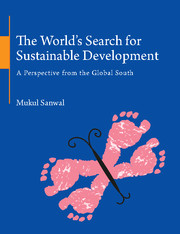Book contents
- Frontmatter
- Dedication
- Contents
- Preface
- Acknowledgments
- Abbreviations
- INTRODUCTION
- 1 Social Dimension of Sustainability
- CONSUMPTION IN AN UNEQUAL WORLD: FRAMING INTERNATIONAL COOPERATION
- CLIMATE POLICY: GLOBAL TO NATIONAL
- SUSTAINABLE DEVELOPMENT: NATIONAL TO GLOBAL
- CONSUMPTION IN A MORE EQUAL WORLD: SHAPING SOCIETAL FUNCTIONS
- GEOPOLITICS TO GEOECONOMICS: RURAL–URBAN DIVIDE, RATHER THAN BETWEEN COUNTRIES
- 21 Urban Areas: Sustainable Development and Human Well-being
- 22 Rural Areas: Climate Change, Fragile States and Human Security
- 23 Global Sustainable Development Goals
- 24 Transformative Impact of the Re-Emergence of China
- THE ASIAN CENTURY
- Index
22 - Rural Areas: Climate Change, Fragile States and Human Security
from GEOPOLITICS TO GEOECONOMICS: RURAL–URBAN DIVIDE, RATHER THAN BETWEEN COUNTRIES
Published online by Cambridge University Press: 18 December 2015
- Frontmatter
- Dedication
- Contents
- Preface
- Acknowledgments
- Abbreviations
- INTRODUCTION
- 1 Social Dimension of Sustainability
- CONSUMPTION IN AN UNEQUAL WORLD: FRAMING INTERNATIONAL COOPERATION
- CLIMATE POLICY: GLOBAL TO NATIONAL
- SUSTAINABLE DEVELOPMENT: NATIONAL TO GLOBAL
- CONSUMPTION IN A MORE EQUAL WORLD: SHAPING SOCIETAL FUNCTIONS
- GEOPOLITICS TO GEOECONOMICS: RURAL–URBAN DIVIDE, RATHER THAN BETWEEN COUNTRIES
- 21 Urban Areas: Sustainable Development and Human Well-being
- 22 Rural Areas: Climate Change, Fragile States and Human Security
- 23 Global Sustainable Development Goals
- 24 Transformative Impact of the Re-Emergence of China
- THE ASIAN CENTURY
- Index
Summary
A new rural–urban divide is emerging at the global level because of the adverse impacts of climate variability, and also climate change. The global debate on climate change has evolved through four phases – status of the atmospheric resource, patterns of anthropogenic use of natural resources with global implications, adverse impacts of climate change on both natural resources and economic activity and now as a contributing factor to increased human security risks globally, particularly in rural areas which remain vulnerable to the adverse impacts of climate change. For example, even though Africa's economic growth has been more than 5 per cent on average since 2002 rural– urban inequality has been increasing. This imbalance is most pronounced in social groups living in inhospitable agro-climatic zones, small food crop farmers, workers in the informal sector, the unemployed youth; all of whom together constitute the majority of the population in Africa. These are the symptoms of deeper structural problems that are exasperated by climate variability, but not apparent in the risk-management framework that continues to be adopted which now re-frames adaptation in terms of fragile states.
The industrialized countries that have shaped the evolution of climate change within the United Nations now support a discussion in the United Nations Security Council and the General Assembly on the impact of climate change on maintenance of human security as that would reinforce their thrust on a new principle of shared rather than differentiated responsibilities. Human Security is defined as ‘security’ because it undermines livelihoods, compromises culture and identity, induces migration that people would rather have avoided, and challenges the ability of states to provide the conditions necessary for human security. This shift reflects the recognition that all countries must not only adopt national policies for emissions reductions but also respond to the impact of climate change on national development expressed in terms of human security and vulnerability in rural areas. This re-framing has been put on the agenda of the Security Council.
The United Nations Development Programme in 1994 articulated the concept of ‘human security’, shifting the focus on securing individual people, creating the space to incorporate non-traditional threats into the security agenda and moving away from opportunities and adaptive capacity – a focus on the symptoms rather than the root causes.
- Type
- Chapter
- Information
- The World's Search for Sustainable DevelopmentA Perspective from the Global South, pp. 262 - 273Publisher: Cambridge University PressPrint publication year: 2015



